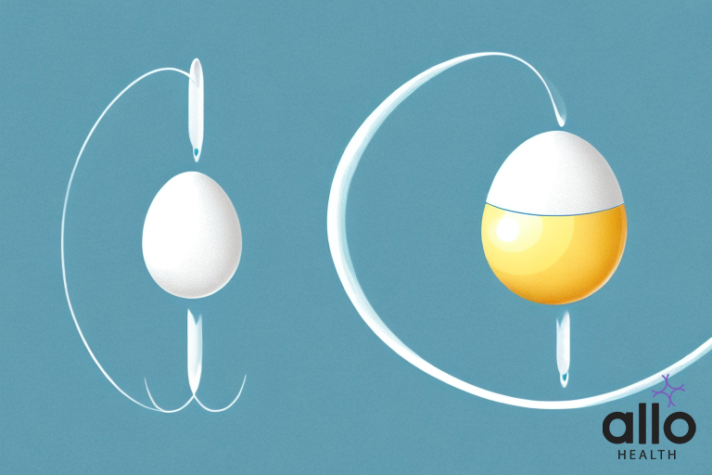Understanding Ejaculation: What You Need to Know

Allo Health is dedicated to personalized well-being, offering support and trusted information tailored to individual health goals. The platform emphasizes human-generated content, led by a distinguished medical team of experts, including physicians and sexual health specialists. Their commitment to credibility involves rigorous fact-checking, authoritative research, and continuous updates to ensure accurate, up-to-date information. Allo Health's unique approach goes beyond conventional platforms, providing expert-led insights and a continuous commitment to excellence, with user feedback playing a crucial role in shaping the platform's authoritative voice.

A psychologist with clinical specialization and experience working with sub-clinical and clinical populations. Her areas of interest and expertise include anxiety-related disorders, mood disorders, psychotic disorders, addictions, sexual health and wellness, relationship issues, stress, and geriatric mental health.
Why This Was Upated?
Our experts continually monitor the health and wellness space, and we update our articles when new information became available.
Updated on 09 June, 2024
- Article was updated as part of our commitment to diversity, equity, and inclusion.

"The following blog article provides general information and insights on various topics. However, it is important to note that the information presented is not intended as professional advice in any specific field or area. The content of this blog is for general educational and informational purposes only.
Book consultation
The content should not be interpreted as endorsement, recommendation, or guarantee of any product, service, or information mentioned. Readers are solely responsible for the decisions and actions they take based on the information provided in this blog. It is essential to exercise individual judgment, critical thinking, and personal responsibility when applying or implementing any information or suggestions discussed in the blog."
Ejaculation is a natural and important part of male sexual function. Yet many men know little about how it works or the different types of ejaculation.
In this article, we will discuss the scientific and psychological aspects of ejaculation, the different types of ejaculation, as well as common issues related to ejaculation and how to address them. We will also explore the connection between ejaculation and sexual satisfaction, fertility, and overall health. So, buckle up, and get ready to learn everything you need to know about ejaculation!
The Science Behind Ejaculation: How it Works

The process of ejaculation starts in the brain, where a series of complex signals trigger the contraction of muscles in the pelvic region. During sexual arousal, these muscles contract and cause semen to flow from the testicles into the urethra. Finally, the muscle contractions push the semen out of the penis in a rhythmic manner. The entire process takes only around 10 seconds but involves several different organs, hormones, and muscle groups.
It is important to note that ejaculation is not always accompanied by orgasm. While the two are often linked, they are separate physiological processes. Ejaculation can occur without orgasm, and vice versa. Additionally, the amount of semen released during ejaculation can vary greatly from person to person and even from one ejaculation to the next. Factors such as age, frequency of sexual activity, and overall health can all affect the volume of semen produced.
Types of Ejaculation: Exploring the Differences
Ejaculation is a natural physiological process that occurs during sexual arousal and orgasm. While it is commonly associated with the release of semen from the penis, it’s important to note that there are different types of ejaculation that can be experienced. Here are some of the types of ejaculation that are recognized:
Antegrade Ejaculation: Antegrade ejaculation is the most common type of ejaculation experienced by individuals with a penis. It occurs when semen is expelled from the urethra during orgasm. The rhythmic contractions of the pelvic floor muscles propel the semen through the urethra and out of the body.
Retrograde Ejaculation: Retrograde ejaculation is a condition in which the semen is redirected into the bladder instead of being expelled through the penis. This occurs when the sphincter muscle at the base of the bladder fails to close properly during ejaculation, allowing the semen to flow backward. Retrograde ejaculation is more commonly seen in individuals with certain medical conditions, such as diabetes, spinal cord injuries, or prostate surgery.
Dry Orgasm: Dry orgasm, also known as “orgasmic anejaculation,” is a condition in which orgasm occurs without the release of semen. Although sexual arousal and orgasm may be experienced, there is no ejaculation or expulsion of fluid from the penis. Dry orgasms can be caused by various factors, including certain medications, prostate surgery, or medical conditions that affect the reproductive system.
Premature Ejaculation: Premature ejaculation refers to the condition where ejaculation occurs sooner than desired, often before or shortly after penetration. It is characterized by a lack of control over ejaculation and can lead to sexual dissatisfaction or relationship difficulties. Premature ejaculation can have various causes, including psychological factors, hypersensitivity of the penis, or underlying medical conditions.
Delayed Ejaculation: Delayed ejaculation, also known as “retarded ejaculation” or “inhibited ejaculation,” is a condition in which it takes an extended period of time or is difficult to achieve ejaculation during sexual activity. It may involve a prolonged period of sexual stimulation before ejaculation occurs or the inability to ejaculate altogether. Delayed ejaculation can be caused by psychological factors, medication side effects, or certain medical conditions.
It’s important to note that while some types of ejaculation may be considered within the normal range of sexual functioning, others, such as retrograde ejaculation or persistent delayed ejaculation, may require medical evaluation and treatment.
If you have concerns about your ejaculation patterns or if it is causing distress, it is recommended to consult with a healthcare professional or urologist who specializes in sexual health. They can provide a proper diagnosis, determine any underlying causes, and recommend appropriate treatment options tailored to your specific situation.
Common Ejaculation Issues and How to Address Them
Some individuals may experience issues related to ejaculation, such as premature ejaculation or delayed ejaculation. Premature ejaculation happens when an individual ejaculates before they or their partner desires, often within two minutes of penetration.
Delayed ejaculation, on the other hand, is when an individual has trouble ejaculating at all, despite being sexually aroused during sexual intercourse. There are several treatments available for both of these issues, such as behavioral therapy, medications, or numbing agents. Seeking the help of a health care provider can be helpful in addressing these issues.
It is important to note that ejaculation issues can also be caused by underlying medical conditions, such as prostate problems or nerve damage. In some cases, addressing the underlying condition can help alleviate the ejaculation issue. Additionally, practicing relaxation techniques, such as deep breathing or meditation, can help reduce anxiety and stress that may contribute to premature ejaculation.
Communication with sexual partners can also be helpful in addressing ejaculation issues. Openly discussing concerns and desires can help reduce anxiety and improve sexual satisfaction for both partners. It is important to remember that ejaculation issues are common and treatable, and seeking help from a healthcare provider or therapist can lead to improved sexual health and overall well-being.
Ejaculation and Fertility: What You Need to Know
Ejaculation is vital for fertility. During ejaculation, semen containing sperm cells is released, which are necessary for fertilization. Individuals with fertility issues may benefit from evaluating their semen quality through testing or consulting a healthcare provider.
It is important to note that factors such as age, lifestyle choices, and certain medical conditions can affect semen quality and fertility. For example, smoking, excessive alcohol consumption, and obesity can all have negative impacts on sperm count and motility. Additionally, conditions such as diabetes and certain infections can also affect fertility. It is important to maintain a healthy lifestyle and seek medical attention if you have concerns about your fertility.
Debunking Ejaculation Myths and Misconceptions
Myth: Ejaculation always occurs at the same time as orgasm.
Fact: While ejaculation and orgasm often occur simultaneously, they are separate physiological processes. It is possible to experience orgasm without ejaculation (dry orgasm) or to have ejaculation without experiencing a full orgasm.
Myth: Ejaculation is always a sign of sexual satisfaction.
Fact: Ejaculation is a normal part of the sexual response cycle, but it does not necessarily indicate sexual satisfaction or pleasure. Sexual satisfaction involves a complex interplay of physical, emotional, and psychological factors that can vary from person to person.
Myth: Ejaculation is only experienced by cisgender men.
Fact: Ejaculation is commonly associated with cisgender men, but it is important to recognize that people of all genders can experience ejaculation. Individuals assigned female at birth can experience ejaculation through the release of fluid from the Skene’s glands, commonly referred to as female ejaculation.
Myth: Premature ejaculation is always caused by physical factors.
Fact: Premature ejaculation can have both physical and psychological causes. While certain physical factors such as hypersensitivity or inflammation may contribute to premature ejaculation, psychological factors like performance anxiety, relationship issues, or stress can also play a significant role.
Myth: Delayed ejaculation is always a sign of a physical problem.
Fact: Delayed ejaculation can have both physical and psychological causes. While certain physical factors such as nerve damage or hormonal imbalances can contribute to delayed ejaculation, psychological factors like anxiety, depression, or relationship issues can also lead to difficulty in achieving ejaculation.
Myth: Ejaculation problems are untreatable.
Fact: Many ejaculation problems can be effectively treated. Depending on the underlying cause, treatment options may include therapy, medication, lifestyle changes, or a combination of approaches. It’s important to consult with a healthcare professional or a sex therapist who can provide appropriate guidance and support.
Myth: Masturbation causes delayed ejaculation or other ejaculation problems.
Fact: Masturbation, when practiced in a healthy and moderate manner, does not cause ejaculation problems. In fact, it can help individuals become more familiar with their own sexual response and improve sexual functioning. However, excessive or compulsive masturbation may contribute to temporary difficulties in ejaculation.
Myth: Using ejaculation-enhancing products or supplements is always safe and effective.
Fact: The use of ejaculation-enhancing products or supplements is not guaranteed to be safe or effective. It’s important to approach such products with caution and consult with a healthcare professional before use. Some products may make false claims or contain ingredients that could be harmful or interact negatively with medications.
It’s essential to rely on accurate information and seek professional advice when it comes to understanding ejaculation and addressing any concerns or difficulties. Each individual’s experience may vary, and personalized guidance can help determine the most appropriate course of action for managing ejaculation-related issues.
The Role of Psychology in Ejaculation: Mind-Body Connection

The mind-body connection plays an essential role in ejaculation. Emotional states can influence the physiological processes involved in ejaculation, resulting in premature or delayed ejaculation. Stress, anxiety, or depression can all impact sexual function. Addressing underlying psychological issues with therapy or counseling can be an effective treatment for ejaculation issues related to stress or anxiety.
In addition to stress and anxiety, other psychological factors can also impact ejaculation. For example, relationship issues, such as communication problems or unresolved conflicts, can lead to sexual difficulties, including premature ejaculation. Similarly, past traumas or negative experiences related to sex can also affect sexual function.
It is important to note that psychological factors can also play a role in delayed ejaculation. In some cases, individuals may struggle to reach orgasm due to psychological barriers, such as performance anxiety or a fear of intimacy. Addressing these underlying issues through therapy or counseling can help improve sexual function and overall well-being.
Techniques for Improving Ejaculatory Control and Stamina
Improving ejaculatory control and stamina can greatly enhance sexual experiences and satisfaction. Here are some techniques that can help you develop better control over ejaculation and improve stamina:
Start-And-Stop Method: The start-stop technique involves stimulating the penis until you feel the urge to ejaculate, then stopping stimulation for a brief period until the urge subsides. Once the urge diminishes, you can resume stimulation. This technique helps you become more aware of your arousal levels and teaches you to prolong sexual activity before reaching ejaculation.
Pelvic Floor Exercises: Strengthening your pelvic floor muscles through exercises, commonly known as Kegel exercises, can improve ejaculatory control and stamina. These exercises involve contracting and relaxing the muscles used for urination and ejaculation. Regular practice can enhance muscle tone and control during sexual activity.
Deep Breathing and Relaxation: Deep breathing exercises and relaxation techniques can help reduce anxiety and promote a sense of calm during sexual activity. Taking slow, deep breaths and focusing on relaxation can help you maintain control over your arousal and delay ejaculation.
Masturbation Practice: Masturbation can be a useful practice for improving ejaculatory control. During masturbation, try to identify your “point of no return,” which is the moment just before ejaculation becomes inevitable. By recognizing this point, you can practice stopping or slowing down stimulation to prolong sexual activity.
Communication with Your Partner: Openly communicate with your partner about your sexual experiences, desires, and needs. Understanding each other’s expectations and desires can help create a supportive and satisfying sexual environment.
Healthy Lifestyle: Adopting a healthy lifestyle can contribute to better sexual stamina. Regular exercise, a balanced diet, adequate sleep, and stress management can positively impact your overall energy levels and sexual performance.
Sensate Focus: Engaging in sensate focus can help you become more attuned to your own sexual responses and those of your partner. These exercises involve focusing on pleasurable sensations and exploring various types of touch without the goal of orgasm. This approach helps you build sexual awareness and enhance overall sexual satisfaction.
Seeking Professional Help: If you continue to experience difficulties with ejaculatory control and stamina despite trying these techniques, it may be beneficial to seek guidance from a healthcare professional or sex therapist. They can provide personalized advice, identify any underlying issues, and offer specialized techniques or therapies like couples therapy or sex therapy to address your concerns.
Remember, improving ejaculatory control and stamina takes practice and patience. It’s important to explore these techniques in a comfortable and supportive environment with your partner. With time and effort, you can develop better control over ejaculation and enhance your sexual experiences.
The Connection Between Ejaculation and Sexual Satisfaction
Ejaculation is a crucial part of sexual satisfaction for most men. For some, the absence of ejaculation can cause feelings of frustration or dissatisfaction. Understanding the factors that influence ejaculation and exploring different types of ejaculation can improve sexual satisfaction for both partners.
One factor that can influence ejaculation is age. As individuals age, they may experience changes in their ejaculatory function, such as a decrease in the volume of semen or a longer refractory period between orgasms. Additionally, certain medical conditions or medications can affect ejaculation, leading to difficulties or delays in reaching orgasm.
Exploring different types of ejaculation, such as delayed ejaculation or multiple orgasms, can also enhance sexual satisfaction. Delayed ejaculation, where an individual has difficulty ejaculating or cannot ejaculate at all, can be a source of frustration for some couples. However, with patience and communication, couples can learn to enjoy the prolonged pleasure that delayed ejaculation can bring. Similarly, exploring multiple orgasms, where a man is able to have multiple ejaculations during one sexual encounter, can lead to heightened sexual satisfaction for both partners.
Alternative Methods for Achieving Orgasm Without Ejaculation
While ejaculation is a crucial part of sexual satisfaction for most men, it is not necessary to experience orgasm. Some men may choose to explore alternative methods for achieving orgasm, such as practicing non-ejaculatory orgasms or exploring different forms of sexual activity that do not involve ejaculating. Communication with sexual partners and a willingness to experiment can enhance sexual pleasure and lead to fulfilling sexual experiences.
One alternative method for achieving orgasm without ejaculation is through the practice of tantric sex. This ancient practice involves focusing on the breath and building sexual energy throughout the body, leading to intense and prolonged orgasms without ejaculation. Another method is through prostate stimulation, which can lead to powerful orgasms without the need for ejaculation.
It is important to note that not all men may be interested in exploring alternative methods for achieving orgasm without ejaculation, and that is perfectly okay. It is important to prioritize individual preferences and comfort levels when it comes to sexual exploration and experimentation. Ultimately, the most important aspect of sexual satisfaction is open communication and mutual respect between partners.
The Health Benefits of Regular Ejaculation
Regular ejaculation offers several potential health benefits for individuals. Here are some of the health benefits associated with regular ejaculation:
Improved Prostate Health: Ejaculation helps to flush out potentially harmful substances from the prostate gland. Regular ejaculation may reduce the risk of developing certain prostate conditions, such as prostatitis (inflammation of the prostate) and benign prostatic hyperplasia (enlargement of the prostate).
Reduced Risk of Erectile Dysfunction: Regular sexual activity and ejaculation can help maintain healthy blood flow and nerve function in the genital area. This may contribute to a reduced risk of erectile dysfunction, a condition characterized by the inability to achieve or maintain an erection sufficient for sexual activity.
Stress Relief: Ejaculation triggers the release of endorphins and other feel-good hormones, which can promote relaxation and stress relief. It can help reduce anxiety, improve mood, and enhance overall mental well-being.
Improved Sleep Quality: The release of hormones and the sense of relaxation that follows ejaculation can promote better sleep. It may help individuals fall asleep faster and experience deeper, more restorative sleep.
Enhanced Immune System Function: Some studies suggest that sexual activity and ejaculation may boost immune system function. Regular ejaculation may increase the levels of certain antibodies in the body, improving the body’s ability to fight off infections and illnesses.
Pain Relief: The release of endorphins during ejaculation can have a pain-relieving effect. It may help alleviate headaches, menstrual cramps, and certain types of body pain.
Strengthened Pelvic Floor Muscles: The contractions that occur during ejaculation can help strengthen the pelvic floor muscles. Strong pelvic floor muscles are essential for bladder control, sexual function, and overall core stability.
Improved Sexual Satisfaction: Regular ejaculation can enhance sexual satisfaction and pleasure. It allows individuals to explore their sexuality, experience orgasm, and connect intimately with their partners.
The Effect of Age on Male Ejaculation: Changes and Challenges
As men age, changes in sexual function can occur, including changes in ejaculation. Men may experience decreased semen volume or difficulties maintaining an erection. These changes can impact sexual satisfaction, but there are several treatments available to address these issues. Seeking medical attention can help address the changes and challenges that come with aging.
One of the most common changes that occur with age is a decrease in testosterone levels. This can lead to a decrease in libido and sexual desire, which can in turn affect ejaculation. Additionally, certain medical conditions such as diabetes or prostate problems can also impact ejaculation in older men.
However, it’s important to note that not all changes in ejaculation are necessarily negative. Some men may experience longer-lasting orgasms or delayed ejaculation as they age. It’s important to communicate with your partner and healthcare provider about any changes you may be experiencing in order to address them effectively.
The Relationship Between Lifestyle Factors and Ejaculatory Function
Lifestyle factors, such as diet, exercise, and substance use, can all impact ejaculatory function. Maintaining a healthy, balanced lifestyle can reduce the risk of sexual dysfunction and improve overall sexual health. Men may also benefit from avoiding substances such as alcohol or tobacco, which can affect sexual function.
Overall, understanding ejaculation is essential for men’s sexual and overall health. By exploring the various aspects of ejaculation, including the science behind it, different types, and common issues, men can improve their sexual function and satisfaction. With the right knowledge and treatment, men can experience fulfilling sexual experiences throughout their lives.
It is important to note that psychological factors can also play a role in ejaculatory function. Stress, anxiety, and depression can all contribute to sexual dysfunction, including premature ejaculation. Seeking therapy or counseling can be helpful in addressing these underlying psychological issues and improving sexual function and thus fostering healthy sexual relationships.
Frequently Answered Questions
Q: What is semen?
A: Semen is the fluid that is released during ejaculation. It is a mixture of sperm cells, seminal fluid, and other substances produced by the male reproductive system.
Q: Can ejaculation occur without orgasm?
A: Yes, it is possible for ejaculation to occur without orgasm. Some individuals may experience a phenomenon known as “ejaculatory inevitability,” where semen is released without experiencing the intense pleasurable sensations associated with orgasm.
Q: How much semen is typically ejaculated?
A: The volume of semen released during ejaculation can vary among individuals. On average, it is estimated to be around 2-5 milliliters (about a teaspoon). However, this can be influenced by factors such as overall health, age, hydration, and sexual frequency.
Q: How long does it take to recover after ejaculation?
A: The recovery time after ejaculation, also known as the refractory period, varies from person to person. It can range from a few minutes to several hours. Factors such as age, overall health, and individual physiology can influence the length of the refractory period.
Q: Is it normal for semen to have a strong odor?
A: Semen typically has a distinct odor, but it should not have a strong or foul smell. If semen has an extremely unpleasant or fishy odor, it could indicate an infection or other underlying medical condition. In such cases, it is recommended to consult a healthcare professional.
In all, understanding ejaculation is a crucial aspect of human sexuality and reproductive health. Throughout this article, we have explored the various components and processes involved in ejaculation, shedding light on its physiological, psychological, and emotional dimensions. By demystifying this natural phenomenon, we can foster a greater appreciation for the intricacies of human sexuality and improve the well-being of individuals and their relationships.
Moreover, increased knowledge about ejaculation empowers individuals to make informed decisions regarding their sexual health and explore avenues for pleasure and intimacy. As we continue to unravel the complexities of ejaculation, it is essential to promote open and honest discussions, challenge misconceptions, and prioritize comprehensive sexual education. Ultimately, by embracing a deeper understanding of ejaculation, we can cultivate healthier attitudes towards sexuality and enhance our overall sexual experiences.







































